Everest Base Camp trekking is a 12-day journey that takes adventurers through the heart of the Himalayas. Trekkers will explore picturesque Sherpa villages, ancient monasteries, and reach the renowned Everest Base Camp at an elevation of 5,364 meters. This moderate-level trek requires a decent level of physical fitness and prior trekking experience, with a focus on acclimatization to combat altitude sickness. Immersed in stunning landscapes and rich Tibetan Buddhist culture, this unforgettable adventure promises to captivate the senses and leave a lasting impression. But what lies in store for those who embark on this extraordinary expedition?
Key Points
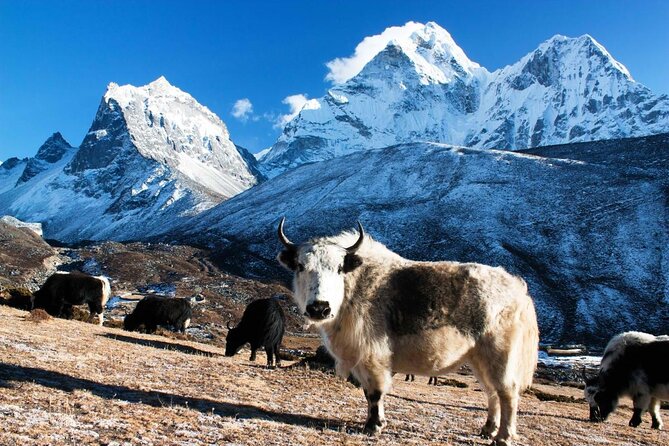
- A 12-day trekking adventure to Everest Base Camp, accessible from Kathmandu, Nepal, for a group of 2 to 15 participants with moderate physical fitness.
- The package includes private transportation, full board meals, lodge accommodation, round-trip flights to Lukla, professional guides, and necessary permits.
- Trekkers should be prepared with essential gear like a sleeping bag, waterproof outerwear, sturdy hiking boots, and trekking poles to navigate the challenging terrain.
- Participants should be aware of the risks of altitude sickness and the importance of proper acclimatization during the trek.
- The trek is not recommended for individuals with serious medical conditions, back problems, or pregnancy, as it requires a moderate level of physical fitness and prior trekking experience.
Trek Overview
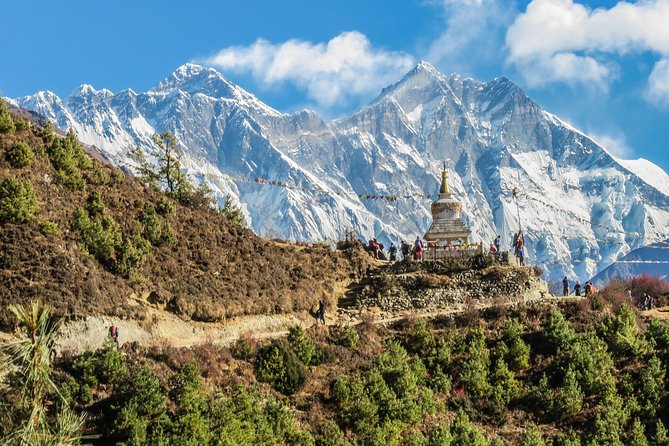
Spanning 12 days, the Everest Base Camp trek takes adventurous travelers on a captivating journey to the iconic base camp of the world’s tallest mountain, Mount Everest.
The trek is located in Kathmandu, Nepal, and the group size ranges from a minimum of 2 to a maximum of 15 participants. Moderate physical fitness is required to complete this challenging yet rewarding trek.
The trek begins promptly at 6:15 am, ensuring an early start to maximize the day’s progress.
With a professional English-speaking guide and porter support, trekkers can look forward to a remarkable experience as they ascend towards the magnificent Everest Base Camp.
Ready to hit more trails? More hiking adventures we feature in Kathmandu
Inclusions and Exclusions
The Everest Base Camp trekking package includes a comprehensive set of services to ensure a seamless and enjoyable experience.
Travelers will benefit from private ground transportation, full board meals during the trek, twin-sharing lodge accommodation, and round-trip flights between Kathmandu and Lukla.
Plus, the package provides a professional English-speaking guide, porter support, trekking maps, first aid kits, and all necessary permits.
However, the package excludes international airfares, Nepal entry visa, personal expenses, travel insurance, and tips for the staff.
Participants should also note that the trek isn’t suitable for those with serious medical conditions, back problems, or pregnancy.
Meeting and Pickup
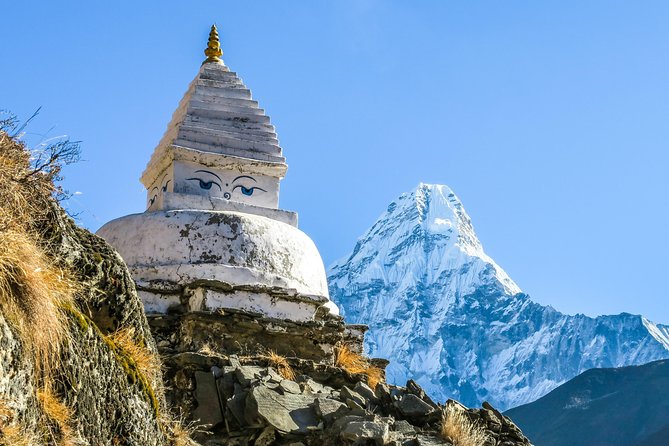
Upon arriving at Tribhuvan Airport in Kathmandu, travelers will be met by an airport representative holding a name card.
The representative will greet the travelers and escort them to their private ground transportation for the transfer to their hotel. This pickup service is included in the trek package, ensuring a seamless and convenient arrival experience for participants.
The vehicle will take them directly to their accommodations in Kathmandu, where they can rest and prepare for the upcoming Everest Base Camp trekking adventure.
Equipment Checklist
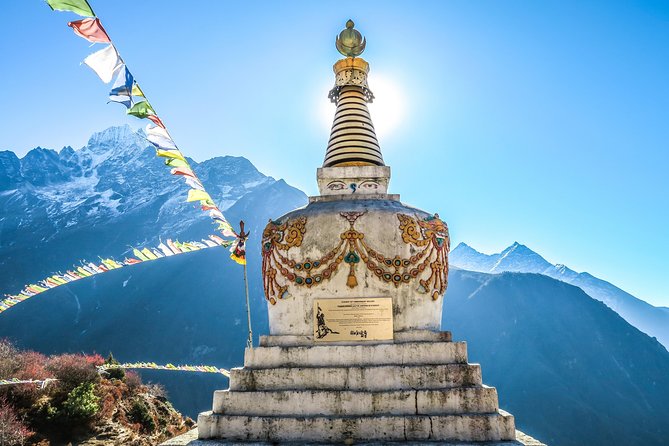
Trekkers preparing for the Everest Base Camp journey will need to ensure they have the essential gear required for the trek. The equipment checklist includes key items like a sleeping bag rated for freezing temperatures, waterproof outerwear, sturdy hiking boots, and trekking poles. Hikers should also pack a day pack, basic first aid kit, sun protection, and lightweight clothing. To further assist in planning, the following table outlines the essential and optional gear:
| Essential Gear | Optional Items |
|---|---|
| Sleeping bag | Fleece Wind-Stopper jacket |
| Waterproof shell | Binoculars, reading materials |
| Fleece jacket | Travel games |
| Hiking boots | |
| Trekking poles |
Health and Safety
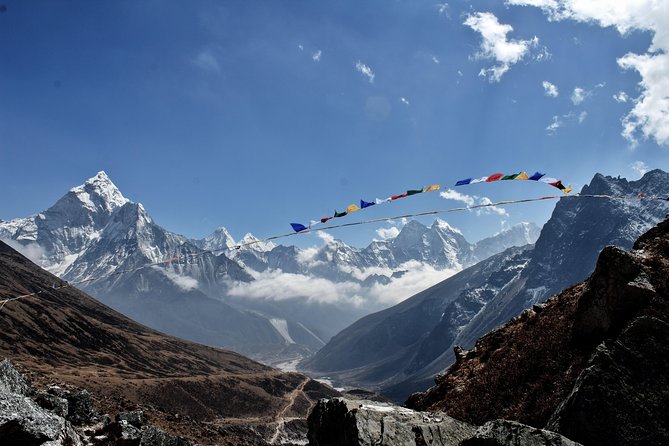
Travelers must be aware of certain health and safety considerations when undertaking the Everest Base Camp trek. The high altitude trek isn’t recommended for those with serious medical conditions, back problems, or pregnancy.
Participants need to be in moderate physical shape to handle the strenuous hike. Altitude sickness is a serious concern, and trekkers should be prepared to recognize and address symptoms. Proper acclimatization and staying hydrated are crucial.
The trekking company provides a first-aid kit, but travelers should bring personal medications and essential toiletries. Trip insurance covering emergency evacuations is highly recommended.
With the right preparation and precautions, the Everest Base Camp trek can be an exhilarating and safe experience.
- Everest Base Camp Helicopter Tour Stop at Everest View Hotel
- Private Kathmandu Sightseeing Tour – UNESCO World Heritage Sites
- Everest Base Camp Helicopter Tour Landing at Hotel Everest View
- 14-Day Private Annapurna Base Camp Trek
- Everest Base Camp Trek-12 Days
- 200 Hours Yoga Teacher Training at Nepal Yoga Home (Starts on 1st of Everymonth)
Pricing and Policies
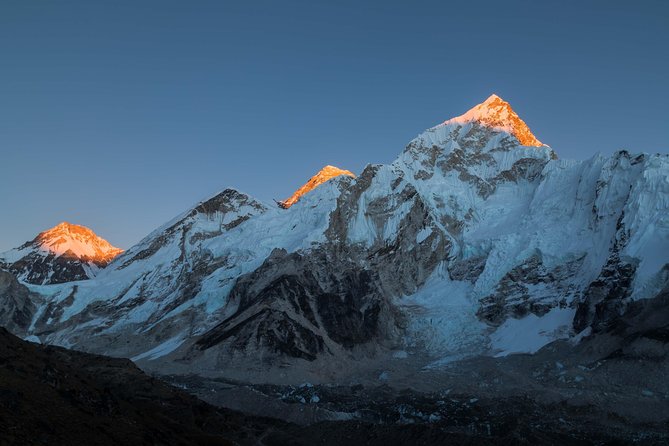
The cost of the Everest Base Camp trek varies depending on group size, with a minimum of two and a maximum of 15 participants. Included in the price are private ground transport, full board meals, twin-sharing lodge accommodation, round-trip flights to Lukla, professional guides, and necessary permits.
However, international airfare, Nepal visa, personal expenses, and tips are excluded.
Travelers should also note the following policies:
- Booking requires passport details, with a vegetarian option available.
- The trek isn’t suitable for those with serious medical conditions, back problems, or pregnancy.
- Free cancellation is possible up to 24 hours before the start of the experience.
- Confirmation is received at the time of booking.
Destination Highlights
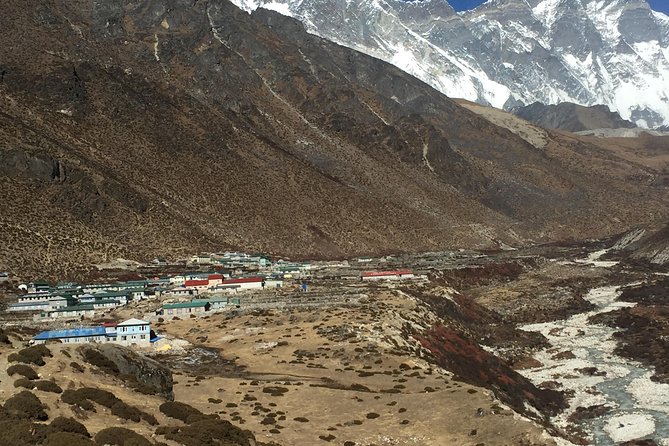
The Everest Base Camp trek offers a once-in-a-lifetime opportunity to take in the captivating landscapes and rich cultural heritage of the Himalayan region.
The 12-day journey takes trekkers through picturesque Sherpa villages, past ancient monasteries, and up to the iconic Everest Base Camp at an elevation of 5,364 meters.
Along the way, you will be treated to stunning vistas of the world’s highest peaks, including the mighty Everest.
The trek also allows travelers to gain insight into the fascinating Tibetan Buddhist culture, as they interact with the friendly local Sherpas and witness their traditional way of life.
Trekking Difficulty
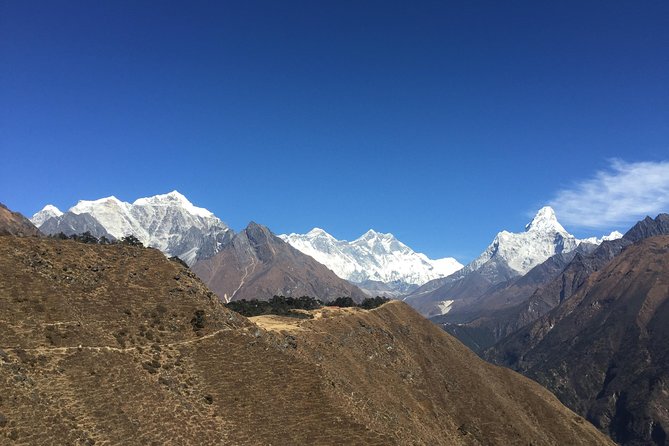
The Everest Base Camp trek is considered a moderate-level trek, requiring a decent level of physical fitness and prior trekking experience.
While not technically challenging, the high altitudes and strenuous hiking can be demanding.
Key factors to consider include:
-
Elevation Gain: The trek involves a significant ascent, reaching an altitude of 5,364 meters (17,598 feet) at Everest Base Camp.
-
Terrain: The trail traverses a variety of landscapes, including steep inclines, rocky paths, and uneven terrain.
-
Weather Conditions: Trekkers must be prepared for fluctuating temperatures, strong winds, and potential snowfall, especially at higher elevations.
-
Acclimatization: Proper acclimatization is crucial to minimize the risks of altitude-related illnesses, such as acute mountain sickness.
Frequently Asked Questions
What Is the Weather Like During the Trek?
The weather during the trek is generally cool and dry, with temperatures ranging from around freezing at higher elevations to pleasant during the day. Hikers should prepare for potential snowfall, especially at the higher campsites along the route.
Is There Any Altitude Sickness Treatment Available?
The trek organizers provide medical equipment and oxygen on the trail to treat altitude sickness. Guides are trained to monitor trekkers’ health and can administer emergency care if needed. Proper acclimatization is vital to prevent altitude-related issues.
Can I Extend My Stay in Kathmandu After the Trek?
Yes, you can extend your stay in Kathmandu after the trek. The tour operator can assist with booking additional hotel nights and arranging any extra activities or excursions you’d like to do in the city.
Can I Rent Equipment in Kathmandu Instead of Bringing My Own?
Yes, trekkers can rent equipment in Kathmandu instead of bringing their own. Many outdoor gear shops offer quality hiking and camping equipment rentals at reasonable prices, so travelers don’t have to worry about lugging heavy gear.
How Can I Prepare Mentally and Physically for the Trek?
To prepare mentally and physically for the trek, one should build cardiovascular endurance through regular exercise, practice deep breathing techniques to manage altitude, and cultivate a positive mindset by learning about the trekking route and tips for handling challenges.
Recap
The Everest Base Camp trek offers an unparalleled experience for adventurers seeking to enjoy the majestic Himalayas. Trekkers will be rewarded with stunning vistas, cultural encounters, and a sense of personal achievement upon reaching the base camp at an impressive elevation. With proper preparation and a focus on acclimatization, this moderate-level trek is a remarkable journey that will leave a lasting impression on all who undertake it.
More Hiking & Trekking Tours in Kathmandu
More Tour Reviews in Kathmandu
Not for you? Here's more things to do in Kathmandu we have recnetly reviewed
- 2 Best Guided Tours In Jagat
- 20 Best 2 Day Tours In Kathmandu
- 20 Best 3 Day Tours In Kathmandu
- 20 Best 4 Day Tours In Kathmandu
- 8 Best Dining Experiences In Kathmandu
- 20 Best Full-Day Tours In Kathmandu
- 25 Best Helicopter Flights And Tours In Kathmandu
- 25 Best Helicopter Flights And Tours In Kathmandu
- 13 Best Massage And Relaxation Services In Kathmandu
- 5 Best Photography Experiences In Kathmandu
- 8 Best Dinner Tours In Kathmandu
- 17 Best Lunch Experiences In Kathmandu
